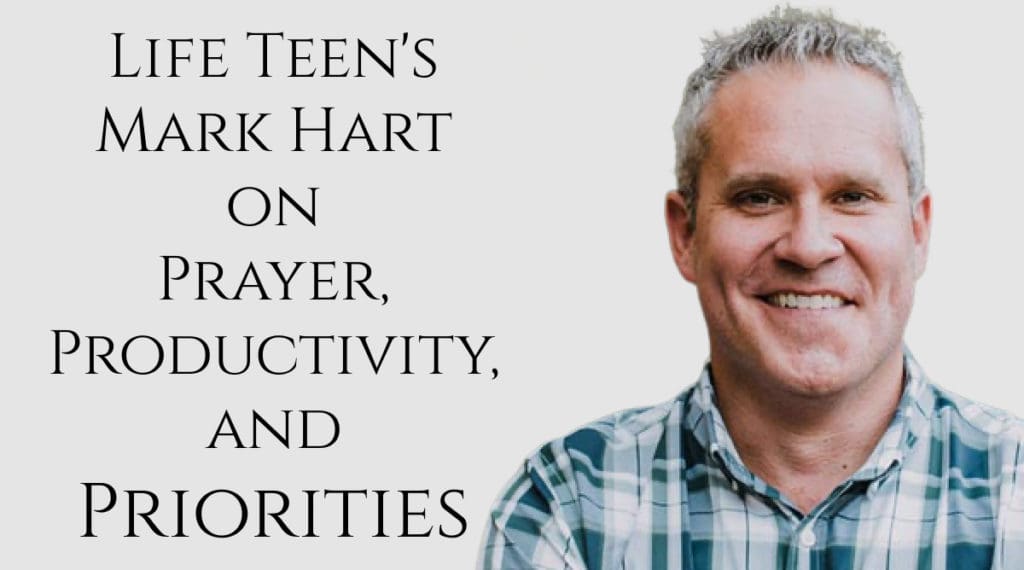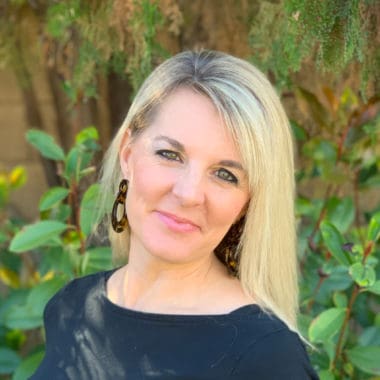I recently had the privilege to have an in-depth conversation with Mark Hart, Chief Innovation Officer for Life Teen International, prolific writer and speaker, radio host, and husband and father, on his take on how to put first things first in a life of active ministry. We may not all lead a huge Catholic organization, but we are all trying to find time for the essential things in an increasingly distracting and busy world. Mark’s advice is relevant and couldn’t be more timely, at least for this busy working mom.
Claire Dwyer: Mark, can you tell our readers about yourself and the work that you do?
Mark Hart: I’m just finishing my 27th year in youth ministry. I was at a parish for a couple of years and then started working for LifeTeen International back in 1997. I’ve worn a lot of different hats there, but most of my time now is spent developing resources, speaking, and training priests, youth ministers, and catechists on how to most effectively communicate the Gospel to the next generation.
I never intended to go into ministry — it was never my ‘plan.’ But I’ve been very blessed in that time, and I’ve enjoyed working side by side with many different apostolates and movements. I’ve gotten to experience a lot of different facets of the Church, different spiritualities, and different people. It’s been a fun surprise.
Claire Dwyer: Sounds like you have a very active life and ministry. How do you find time for prayer and your own personal spiritual growth?
Mark Hart: I’m a little spoiled! We have a Blessed Sacrament chapel in our office. I’m very blessed in that way—I have the Lord of the Universe just 92 feet from my door.
If it weren’t for daily Eucharistic encounters, I would have been out of ministry decades ago.
We really emphasize to our staff the importance of daily Mass, and if for some reason they cannot make it to Mass, we encourage a daily Holy Hour (or half-hour).
Prioritizing the Eucharist has really been the most life-changing thing for me. If you, as a leader, are not rooting yourself in the Eucharist—and I’ll add, in Scripture, too—then you are really only a program director. And you are really not in ministry at all.
St. John Bosco had this vision where he saw the Church being attacked on all sides, assaulted by the enemy. He saw the Pope at the helm of the ship, the Church. And as the Church, was being attacked, two pillars arose out of the ocean: on one pillar was the monstrance, and on the other was the Blessed Virgin. St. John Bosco heard, “Chain yourself to these two pillars, and you’ll never topple or go asunder.”
As a movement, we’ve really embraced that vision. Life Teen is consecrated to Our Lady, and we are rooted and founded in the Eucharist. So if you ever go to a LifeTeen event, whether it is a camp or a training conference, you’ll always see, flanking our stage, images of the Blessed Virgin and the Eucharist.
Personally, those are my most important pillars, too. When I’m traveling and out of my time zone, if I can’t make it to daily Mass, there’s always time to stop in a chapel. There’s always time for a rosary. And my Bible’s never more than five feet away.
Claire Dwyer: That reminds me of Fulton Sheen and never missing a Holy Hour in his entire priesthood. I did the math and it added up to 21,900 holy hours. That’s something like 2 1/2 years.
Mark Hart: Can you imagine if every priest was able to say that?
Claire Dwyer: Right. Bishop Sheen’s prayer life resulted in some pretty incredible fruit! And do you find the same—that the work in your apostolate flourishes because of your prioritizing your own prayer time?
Mark Hart: I can absolutely say that in the seasons where I get slothful about my daily Eucharistic encounter, and I slide into, “Well, I can’t make it to Mass today but the Lord will understand,” whenever I walk into that trap, I immediately see it: working in ministry begins to feel like a burden.
The minute ministry becomes more burden than blessing, it’s a dangerous thing. You begin to count the cost. When it’s you doing it and not the Spirit doing it, it’s a recipe for disaster.
The minute ministry becomes more burden than blessing, it’s a dangerous thing.
-Mark Hart
Absolutely. And I think for many of us it can be a temptation to forgo prayer time for active service. So what would you say to someone on your team who was tempted to give it up because there was “so much to do?” And if we don’t have the Blessed Sacrament ninety-two feet from our door, how do we make it such a part of our life that we aren’t tempted to give it up in the busy seasons?
Mark Hart: For us, as a ministry, we had to say, “Listen. Going to Mass is part of your workday. It’s not a plus, it’s not an addendum, it’s not ‘if you can fit it in.’ We will adjust workload, expectations, and everything else to make sure that you can get to Mass on your way to work, you take off and go to the Church around the corner at noon, you can get out the door early to make it at the end of the day.”
That might look like we are going to ‘lose’ productivity, at least on paper. But we trust and know that the Lord won’t be outdone in generosity. He’ll make it up.
Since we made that decision, our productivity has skyrocketed. Our staff is more relaxed, focused, and at ease.
Most people these days have the opportunity to make it to daily Mass. It just takes creativity, communication, and maybe restructuring your work. And if you can’t make it on a daily basis, you might be able to make it work once, twice, three times a week.
Or, if not that—there’s probably a chapel on your way to work or to kid’s activities…how many of us drop off a kid at dance or baseball practice and then have an hour to kill? And in that hour, it’s really easy to check out and say, “I’m going to grab a coffee” or be efficient and say “I’m going to run in for some groceries” but we might be able to carve out 20 or 30 minutes for the Lord, who is not going to be outdone.
We are often so reactive in our lives. We react to financial stresses, familial stresses, and occupational stresses, and then you throw in things like travel, sickness—a pandemic—and the stress level increases. And as our stress level rises and we become more and more reactive. If we just get everyone to Mass on Sunday, we pat ourselves on the back. And that is praiseworthy.
But keeping holy the Sabbath is way more than going to Mass for an hour. And developing your interior life takes a lot of discipline and it takes a proactive approach.
That’s why I love the work of the Avila Foundation and why spiritual direction is so important. It forces you out of that reactive mental and spiritual posture and into something more proactive.
To look at, for example, how am I structuring my day? Am I making a morning offering? Am I spending time in the Word with my coffee in the morning? Am I breaking open the Scriptures with the family over dinner every week so that we are prepared for Sunday Mass? Am I working through some spiritual exercises or spiritual reading? There are ways to set up everything in our life—from the time we get up to the route we take to work—to make those things possible.
Speaking for myself, I don’t want to meet the Lord someday and have to explain why I spent so much time scrolling around looking for something to watch on Netflix, but so little time in the chapel.
Claire Dwyer: This reminds me of the second set of rules of St. Ignatius or the latter mansions of St. Teresa of Avila. When a soul has advanced a certain degree in the spiritual life, the devil changes his tactics. The saints tell us that he tempts us not so much to do bad things but to do good things that are not the good things we are supposed to be doing. And we don’t do the best things.
Mark Hart: Absolutely. When you are actively trying to close those sinful doors, it forces the devil’s hand.
It reminds me of what St. Angela Merici said, “Remember, the devil does not sleep, but seeks our ruin in a thousand ways.” Even when you are at rest, he’s not.
We roll our eyes at Adam and Eve—but Genesis says “the apple was good and pleasing to the eye.” It was attractive. It was good. This is something we emphasize when we are training our parish leaders and youth leaders: it is easy to in ministry to fall into reading scripture to prepare for the next presentation or talk, but not for our own spiritual edification.
Or go to the chapel to “plan” something and not just go be loved by the Father of the Universe.
That’s where it gets really dangerous because there’s always something else that can be done. There’s always one more person in need, one more thing I could do for the parish, one more thing to do around the house.
We can fall into letting our work or our service become our prayer life, instead of letting them flow from our prayer life.
We can fall into letting our work or our service become our prayer life, instead of letting them flow from our prayer life.
-Mark Hart
And you can always tell—there is a deeper more abiding peace in those who have that regular rhythm of prayer.
That’s the key. Having a rhythm of prayer allows you, even in those seasons when prayer is arid, to have to peace and the knowledge that the Spirit is still very much at work.
Claire Dwyer: Let’s zoom out for a moment, Mark. We’ve been talking about a life of prayer, but you are so well connected to so many facets of the Church. For those who might be feeling a sense of discouragement or hopelessness over the state of the Church, where do you see the signs of spiritual renewal and hope?
Mark Hart: I am so hopeful when I look at the youth in the Church. At the end of our summer camps or youth conferences, we do a call for vocations. When I see the number of young men and young women who are open to discernment, or the young adults who are open to serving as missionaries, if only for a year or two, it’s really inspiring.
There is a growing movement of young Catholics who really desire sanctity, and they desire to make a change in the Church and in the world.
I think that’s hopeful, and it’s inspiring to see that translate into holy young priests and holy young religious. I’m good friends with the Sisters of Mary, Mother of the Eucharist. The average age of the sisters in their community is something like 26 years old. While some communities are dying out, others are thriving and growing.
And we have these vibrantly dynamic Catholic universities in small towns all over the country. There is an undeniable movement towards renewal. It’s exciting and inspiring.
Claire Dwyer: I agree. And it’s very hopeful to hear from someone like you who has their finger on the pulse of the Church and is so directly connected to the youth.
Where can we find out more about you, follow the work that you do, and how can we support you?
Mark Hart: You can find me on BibleGeek.com and under that name on social media. And Lifeteen.com houses many of our resources and camp opportunities for teenagers and training opportunities for adults. Amazon has many of my resources and I do a lot of work with Ascension Press. In fact, I just launched Venture, a new Bible timeline study for teens that just came out with Ascension that I’m really excited about and I was able to bring a lot of people on board to help with it. I believe parents, teachers, and leaders will find it helpful.
Claire Dwyer: Thanks, Mark! Prayers for you and your work.




